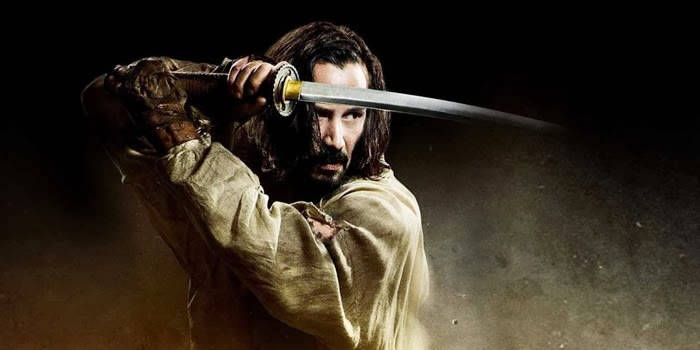47 Ronin Review
Keanu takes a backseat in this reimagining of the Japanese legend.
Review by Isaac Handelman
Given its troubled road to release, 47 Ronin has actually turned out better than it had any right to. The film, which was supposed to release near Christmas 2012, was pushed back to Christmas 2013 after series production delays hampered the planned release schedule (and, many assumed, the quality level) or the finished product. Now 47 Ronin finally sees the light of day, and you know what? It’s not half bad. Sure, the film is hamstrung by numerous issues, and is poorly made in more than one respect, but it manages to achieve a level of self-awareness that imbues the film with an element of likability.
 47 Ronin is based upon an ancient Japanese legend wherein forty-seven rogue samurai seek revenge on the traitor who brought about their master’s demise. Keanu Reeves was given top billing, most likely for marketing reasons, but his character, a half-Japanese outcast named Kai, isn’t truly the film’s main protagonist. That title goes to Oishi, the leader of the Ronin, portrayed well enough by Hiroyuki Sanada. In his supporting role, Reeves serves his purpose, and though he ends up feeling blatantly shoehorned into the narrative, those who pay to get into 47 Ronin simply to see the Canadian star pulling off some nifty samurai stunts will probably walk out of the theater pleased enough.
47 Ronin is based upon an ancient Japanese legend wherein forty-seven rogue samurai seek revenge on the traitor who brought about their master’s demise. Keanu Reeves was given top billing, most likely for marketing reasons, but his character, a half-Japanese outcast named Kai, isn’t truly the film’s main protagonist. That title goes to Oishi, the leader of the Ronin, portrayed well enough by Hiroyuki Sanada. In his supporting role, Reeves serves his purpose, and though he ends up feeling blatantly shoehorned into the narrative, those who pay to get into 47 Ronin simply to see the Canadian star pulling off some nifty samurai stunts will probably walk out of the theater pleased enough.
The film takes a while to get going, spending a significant amount of time on exposition prior to the narrative’s “inciting incident.” Perhaps that’s the first sign that the screenwriters simply had trouble stretching the ancient tale into a suitable two hour feature film, as Ronin slows down and begins to plod along at a few points during its middle portion. Thankfully, the story picks back up by its close, as the finale is well-orchestrated and genuinely exciting. By its close, Ronin’s tale is still startlingly basic in its structure, most likely due to its ancient roots, with little in the way of moral ambiguity; its protagonists and antagonists are practically color-coded for viewers’ ease of identification. The secondary threads that the screenwriters attempt to throw in, such as that of a love story between Kai and Princess Mika, fall flat, providing little to nothing in the way of heightened drama or intelligence.
 Though their inability to craft worthwhile side-plots is exasperating, screenwriters Chris Morgan and Hossein Amini should be commended for their choice not to pull punches with some of 47 Ronin’s more difficult-to-swallow elements. The film is visceral and, at times, quite violent, but the film’s grittiness extends beyond gore; its conclusion is surprisingly melancholy and thoughtful, and not at all the sort of “happily ever after” bookend you’d expect out of a gung-ho action film.
Though their inability to craft worthwhile side-plots is exasperating, screenwriters Chris Morgan and Hossein Amini should be commended for their choice not to pull punches with some of 47 Ronin’s more difficult-to-swallow elements. The film is visceral and, at times, quite violent, but the film’s grittiness extends beyond gore; its conclusion is surprisingly melancholy and thoughtful, and not at all the sort of “happily ever after” bookend you’d expect out of a gung-ho action film.
The journey to get to that ending point can best be described as inconsistent. 47 Ronin is chock full of an enormous volume of small idiosyncrasies that add up to an aggravating whole: actors make strange glances at one another that seems totally out of place, viewers are encouraged to feel sympathetic towards characters they’ve only just met, bizarre fantastical elements leap out of nowhere and go totally unexplained, and some characters’ backgrounds feel severely under-fleshed out. Sometimes, these divergent elements combine to make 47 Ronin a flat-out incoherent experience.
Other times, the film slows down to give a view of its gorgeous scenery, or pays genuine respect to an element of Japanese culture, or showcases some element of wild creativity that leads to an engaging action sequence. An example would be the villainous witch, given life by a creepy, menacing performance by Rinko Kikuchi, who stands out as a memorable character in a film otherwise void of such.
As a whole, I suppose you could say that 47 Ronin confused me. Going by the sensibilities of a film critic, the film is far too slapdash and inherently flawed to place any value in. But as a viewer, I was charmed by the film’s carelessness, which, on a surprising number of occasions, translates onscreen into blissful, suitably carefree entertainment.




Comments
Post a Comment